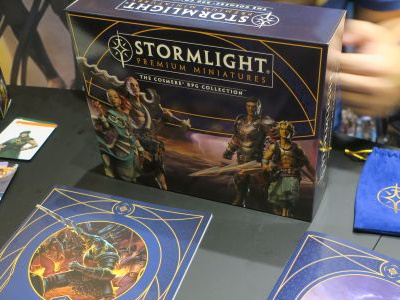Paired Power
Both players take on the role of Alchemist, building decks to do battle with the titular Akora. The game is played with two decks, the Akora deck and the Alchemy Deck. The Akora deck is composed of 9 cards, 3 stage 1 versions of your chosen Akora, 3 of its second stage, and 3 of its third and final stage. Each of these must be of the same Akora, which means that they share a name and attribute.
Your second deck, the Alchemy deck, is composed of 41 cards. It can contain up to 3 copies of any given Alchemy or Battlezone cards, and as many relic shard cards as you like without exceeding the maximum Alchemy deck size. All cards included in this deck must either match your Akora’s attribute, or be Multi Attribute cards. Notably, the balance of relic shards versus other Alchemy cards can be difficult to determine, with many competitive decks running as few as 12 shards. Try experimenting with your numbers to see what feels best!
Starting Out
The goal of the game, like most competitive player versus player games, is to defeat your opponent. Both alchemists begin the game with a starting Alchemist Essence (essentially your life total) of 6000 points. In addition to your starting Alchemist Essence, both players start the game with a hand of 5 Alchemy cards, a stage 1 Akora on the field, and a Relic Shard in play that matches your Akora’s attribute. After drawing the initial hand of five, either player can shuffle up to two cards back into the deck and draw that many. The first player is chosen at random by a method of your choice.
Step by Step
Once your essence is set and you’re happy with your starting hands, the game moves forward in a series of steps. First is the Start Phase, where any start of turn effects activate and resolve. This is swiftly followed by the Draw Phase, where the current player draws a card from their Alchemy deck.
Prepare Yourself
After the draw phase, you move into the Preparation Phase. In this phase, the Alchemist can: play up to 1 Relic Shard from their hand, Play or Activate Alchemy Cards, or Relic Up their active Akora. First let’s stop to talk about your Akora and Relicing Up.
Upping Your Game
You’ve started the game with a stage 1 Akora in play, but you want to power it up, usually as quickly as you can (though there may be strategic reasons to hold off and conserve resources). Your Akora cards feature attacks that are your primary means of beating down your opponents. As you Relic Up, your Akora gets progressively stronger, including a boost to its Soul Points.
Those Soul Points are its defense - if an Attack’s power is greater than the Akora’s Soul Points, the difference is dealt as direct damage to the defending Alchemist’s Essence. When your Akora reaches stage 3, it gains a secondary attack called a Relic Attack that also requires that you destroy one of your Relic Shards as an additional cost to perform this special move.
As for Relicing Up itself, you’ll notice the Relic cost of upgrading a card is in the top left corner of the card. Just remember, that the turn you Relic Up your Akora cannot attack! Similarly, take note you don’t have to go in order when you upgrade – you can jump straight from Stage 1 to 3 if you have the requisite relics! Next, let’s go over the kinds of Alchemy cards you can play before we move past the Preparation Phase.
Alchemical Boost
Alchemy cards in general are straightforward, the effects of any given card readily apparent just by reading the cards! Keep in mind, however, that there are a variety of kinds of Alchemy cards. These include Flash cards, denoted by a lightning symbol, that act as reactions to things your opponent is doing. It also includes Armaments that directly buff your Akora, defined by the Helmet symbol; Battlefield cards that have global effects, denoted by the Attribute Symbol in the Alchemy circle; and permanent Eternity cards that feature an Hourglass symbol.
Prepare for Battle
After working through the Preparation Phase it’s time to move on to the Attack Phase. In this phase, you can declare your Akora’s attack (or Relic attack if in Stage 3) and active any relevant Alchemy or Battlezone cards. As noted previously damage to the opponent is calculated based on the difference between your Attack Power an the defending Akora’s Soul Points. After the attack phase you move to the End Phase, where end of turn effects activate and resolve.
Ending Things
After going through several turn cycles, dealing damage back and forth, the final thing you need to consider is ending the game. While reducing a player’s Alchemist Essence to 0 is the most common win condition, you should keep in mind that there are a few other ways to ultimately win:
- Reduce your opponents Essence to 0.
- Your opponent has no Akora available to play.
- Your opponent has no cards in their Alchemy Deck and is unable to draw.
- Your opponent has no Relic Shards or Stone of Akora and their Active Akora is destroyed.
With all of these elements in mind, you’re ready to play!
Click on Gallery below to see full-sized images.








 View Gallery: 3 Images
View Gallery: 3 Images 



